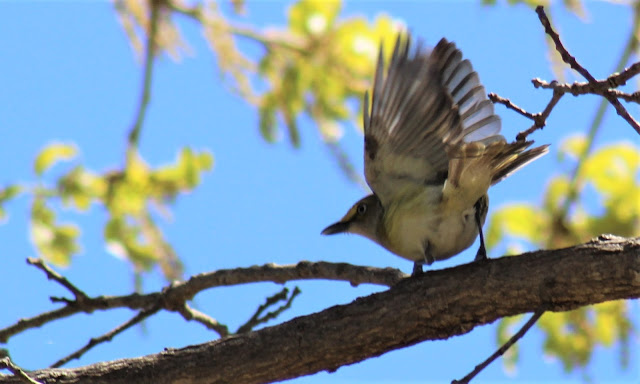I went down to eat breakfast at the
Windham Microtel here in Altus. Pretty
much just a waffle maker and weak coffee at this motel, and they didn’t open
until 6:30. I got out of the motel by
7:30 and drove east to the Wichita Mountains National Wildlife Refuge around
8:30. My reason for back-tracking to this Refuge was to see if I could find the Black-capped Vireo, which I'd never seen before & which would move me toward my goal of seeing 75 "Life Birds" this year.
I initially stopped at the small
dam below the Visitors’ Center, and viewed the Bison and Longhorn Cattle that
are part of this Refuge’s restoration legacy.
 |
| These large mammals are free-ranging, and potentially hazardous |
 |
| My, what big horns you have . . . |
There was a flock of Wild Turkeys, with
the Tom strutting his stuff.
 |
| Perhaps, just a bit ostentatious? |
Then, I drove toward the Quanah Parker
Lake dam.
There is a monument to this amazing
Comanche leader, warrior, and statesman.
If you don’t know the history of Parker and his leadership of the
Quahadi band of the Comanche Nation, the Wikipedia entry is a start. A much better biography is: Empire of the Summer Moon: Quanah Parker and
the Rise and Fall of the Comanches, the Most Powerful Indian Tribe in American
History, by S. C. Gwynne.
 |
| Quanah Parker photo from the Comanche Nation website |
I read the epitaph of Quanah Parker at
the Refuge:
Do not stand at my grave and weep
I am not there, I do not sleep.
I am a thousand winds that blow
I am the diamond glint in snow
I am the sunlight on ripened grain.
I am the gentle autumn rain.
When you wake in the morning hush.
I am the swift uplifting rush
of quiet birds in circling flight.
I am the soft starlight at night.
Do not stand at my grave and weep.
I am not there, I do not sleep.
Ai!
I stopped at a little pullout before I
got to the dam, as there were a number of birds flitting about. Most turned out to be Chipping and Lark Sparrows, but
there were some Myrtle and Orange-crowned Warblers, and a Black-chinned Hummingbird.
 |
| These Lark Sparrows are just such handsome birds! |
 |
| Blue-gray Gnatcatcher |
 |
| We don't get Gnatcatchers in Washington State |
 |
| Hard to see the black chin on this hummingbird . . . |
 |
| . . . Until he turns around! |
 |
| Yay! ABA Life Bird No. 599 |
This species was at the
brink of extinction - only around 350 birds remained - when I started birding,
due to loss of their required habitat of shrubby oak and ‘cedar’ less than 15
feet high. These brushlands are often
cleared to provide grazing for livestock.
Another major threat to the vireo was
the presence of the parasitic Brown-headed Cowbird. Cowbirds lay their eggs in
the nests of vireos and other songbirds.
The nesting bird does not recognize the difference between their eggs
and cowbird eggs, and incubate all the eggs in the nests. Cowbird eggs hatch earlier than vireos, and
the young are larger than the vireo chicks.
As a result, vireo nests parasitized by cowbirds usually fledge only cowbird
young.
The Refuge not only manages their
59,000 acres well, but has also conducted control programs to reduce cowbird
numbers, and the Vireo population has recovered from the brink, now standing
at around 14,000 birds in the Edwards Plateau in Texas and the populations in
west Oklahoma. This recovery resulted in
the species being removed from the Endangered Species list in 2018. It’s nice to see an ESA success story. It will, of course, take on-going management to remain a success.
 |
| No Longer Endangered |
Many of the prairie wildflowers are in
bloom here. I believe that the paintbrush is Castilleja
purpurea, which in spite of its species name comes not only in purple (var.
purpurea) but also in yellow (var. citrina) and a shade that ranges from orange
to red (var. lindheimeri).
 |
| Castilleja "citrina" |
 |
| Castilleja "lindheimeri" |
Many other flowers were showing.
 |
| Meadow Garlic - Allium canadense |
 |
| Prairie "Hyacinth" - Camassia angusta |
 |
| Plains Bee Blossom - Oenothera patriciae (used to be Gaura brachycarpa) |
I walked from the dam to the Doris
Campground and back, finding another pair of Vireos, and seeing my
‘first-of-the-season’ Summer Tanager, and a pair of White-eyed Vireos.
 |
| White-eyed Vireos |
 |
| This species has white eyes . . . who'd a thought? |
I enjoyed talking to the folks who were going
to do some ‘bouldering’ near Little Baldy and going to the Narrows
rock-climbing area. At noon, it was time
to turn back toward home, so I walked back past the reservoir.
 |
| Red-eared Sliders |
I drove north on Highway 49 out of the Refuge and
headed northwest, seeing my second Western Kingbird of the year near the little
burg of Reed, just before I got into Texas.
I ended up staying the night north of Amarillo at the Red Roof Inn in
Dumas, Texas. Supper was at the 287 Roadhouse, where I had a very average sirloin steak and a couple of pints of
ZiegenBock Amber - which was pretty good - for $22. Back at the
motel, I was tired and went to bed early.
Wichita Mountains NWR eBird Checklist is Here
Quanah Parker Dam
area eBird Checklist is Here
Doris Campground area eBird Checklist is Here
Reed, Oklahoma eBird Checklist is Here





No comments:
Post a Comment